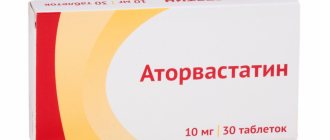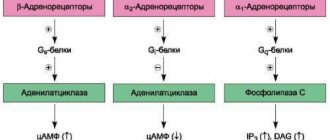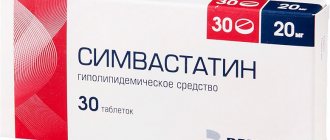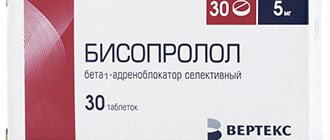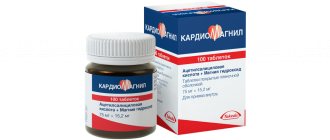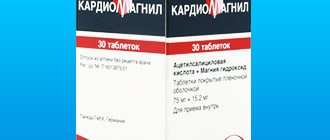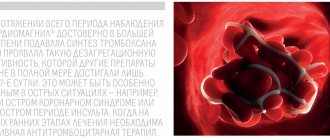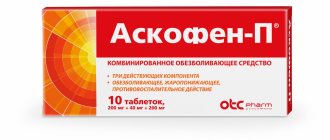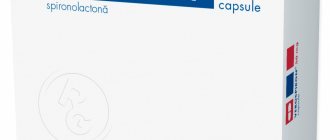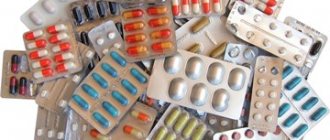For the treatment and prevention of heart and vascular diseases, a modern drug, Cardiomagnyl, was created based on acetylsalicylic acid.
The main purpose is to prevent thrombus formation and blockage of blood vessels with blood clots, to prevent heart attacks and strokes.
Types and composition
The drug is presented in pharmacies in two types of tablets:
- heart-shaped with 75 mg of the main substance;
- oval shaped with a notch for ease of dividing into two parts with a dosage of 150 mg.
Each piece is covered with a film shell and contains acetylsalicylic acid as an active ingredient, as well as magnesium hydroxide.
Additional elements are represented by corn starch, talc, cellulose, magnesium stearate, propylene glycol, potato starch.
Cardiomagnyl tablets are packaged in tinted glass jars with a label of 30 or 100 pieces. Manufacturer: Nicomed, Denmark.
Foreign substitutes
| Name | Price in rubles | About the drug |
| Clopidogrel | From 190 | A medicine that contains the active ingredient clopidogrel bisulfate (hence the name). If indications allow, Clopidogrel is prescribed in tandem with aspirin for an enhanced effect. |
| Trental | From 130 | A modern drug using pentoxifylline. Often prescribed for poor circulation. Trental dilates the coronary arteries, thins the blood, and increases the tone of the respiratory muscles. |
| Thrombo-ASS | From 49 | An antiseptic and antipyretic agent that can be taken for a long time. It copes no less successfully with the manifestations of cardiovascular diseases, as well as during treatment. |
| Aspirin Cardio | From 85 | The main “relative” of Cardiomagnyl (more often prescribed). The main treatment substance is aspirin. Prescribed for the prevention of cardiovascular diseases. However, it has a number of contraindications and side effects. |
For what diseases is it prescribed?
Instructions for use of Cardiomagnyl provide for the possibility of taking it for:
- myocardial damage caused by the absence or disruption of blood supply to the heart muscle - coronary heart disease;
- pre-infarction state;
- myocardial infarction;
- exacerbation of ischemic heart disease;
- secondary prevention of blood clots and vascular thrombosis, myocardial infarction, stroke;
- prevention of thrombosis and acute cardiovascular pathologies in people over 50 years of age and at risk due to excess weight, high blood pressure, atherosclerosis, diabetes mellitus, high cholesterol levels in the blood, and failure of the metabolism of fats and carbohydrates.
As a preventive measure, it is prescribed after vascular operations: stenting, coronary artery bypass grafting, angioplasty. Cardiomagnyl is also taken to prevent the formation of blood clots in the veins of the lower extremities and blockage of large vessels of the lungs after prolonged immobility due to surgery.
Generics from Ukrainian manufacturer
| Name | Price in rubles | About the drug |
| Acecardine | From 84 | A worthy substitute for Cardiomagnyl. Used to treat angina pectoris, acute heart attack, thrombosis. Acecardin is prescribed in the postoperative period. |
| Magnicor | From 92 | Its functions resemble Acecardin. Effectively used for the treatment and prevention of heart attack, stroke, and cerebrovascular accidents. |
How does Cardiomagnyl work?
The mechanism of action is due to the combined composition. Acetylsalicylic acid has a negative effect on the gastrointestinal mucosa and can lead to peptic ulcers or provoke a relapse of an existing disease. Magnesium hydroxide is a hydrochloric acid neutralizer, added to protect the stomach lining from the aggressive effects of aspirin.
Acetylsalicylic acid is a non-steroidal anti-inflammatory drug that has analgesic and antipyretic effects. The dosage of the substance in Cardiomagnyl allows:
- reduce blood clotting;
- prevent platelet clumping;
- prevents the formation of blood clots in large vessels.
The best analogues
In every first aid kit there is a package of acetylsalicylic acid tablets or, more simply, Aspirin. First on the list of analogues in terms of price, quality and availability. In addition, the healing substance is contained in those drugs whose indications for use are similar to Cardiomagnyl.
It's time to make a list of cheap analogues based on acetylsalicylic acid:
- Acecardole.
- Acecardine.
- Aspicor.
- Magnicor.
- Aspirin Cardio.
- Aspinath Cardio.
- CardiASK.
- Thrombo-ASS.
What to do if you are allergic to aspirin?
In this case, medications without aspirin will help:
- Trental.
- Clopidogrel.
Contraindications and side effects
The use of Cardiomagnyl must be approved by a doctor, since the drug has serious contraindications:
- excessive sensitivity to aspirin or any other component;
- intolerance to non-steroidal anti-inflammatory drugs;
- acute period of erosive and ulcerative lesions of the gastrointestinal tract;
- hemorrhagic stroke;
- predisposition to bleeding;
- bronchial asthma provoked by the use of NSAIDs or salicylic acid derivatives;
- gastrointestinal bleeding;
- severe kidney dysfunction;
- deficiency of the enzyme glucose-6-phosphate dehydrogenase;
- taking with the antitumor drug Methotrexate (in an amount of more than 15 mg per week);
- I and III trimesters of pregnancy, breastfeeding.
Prescribed with caution for gout, in the second trimester of pregnancy, with an increase in the amount of urate in the blood, ulcers and bleeding of the gastrointestinal tract in the past, dysfunction of the liver and kidneys, allergic conditions, bronchial asthma.
The following side effects were identified:
- nettle rash;
- angioedema;
- discomfort in the stomach - heartburn, ulcerative lesions of the gastric epithelium, bleeding, nausea, abdominal pain;
- intestinal irritation, inflammation of the colon mucosa;
- inflammation of the mucous membrane of the esophagus or oral cavity;
- bronchospasms;
- headache, sleep disturbances or drowsiness, dizziness;
- the appearance of bleeding, a decrease in hemoglobin levels, a critical decrease in platelet levels, a decrease in the number of neutrophils in the blood.
Cardiomagnyl (tab.p.pl/vol. 75 mg + 15.2 mg No. 30)
A country
Germany
The country of production may vary depending on the batch of goods. Please check with the operator for detailed information when confirming your order.
Compound
1 tablet contains: acetylsalicylic acid 75 mg, magnesium hydroxide 15.2 mg. Excipients: corn starch - 9.5 mg, microcrystalline cellulose - 12.5 mg, magnesium stearate - 150 mcg, potato starch - 2.0 mg. White film-coated tablets, in the shape of a stylized “heart”.
pharmachologic effect
NSAID, antiplatelet agent. The mechanism of action of acetylsalicylic acid is based on irreversible inhibition of the COX-1 enzyme, as a result of which the synthesis of thromboxane A2 is blocked and platelet aggregation is suppressed. It is believed that acetylsalicylic acid has other mechanisms for suppressing platelet aggregation, which expands the scope of its use in various vascular diseases. Acetylsalicylic acid also has anti-inflammatory, analgesic and antipyretic effects. Magnesium hydroxide, which is part of Cardiomagnyl, protects the gastrointestinal mucosa from the effects of acetylsalicylic acid.
Indications for use
- primary prevention of cardiovascular diseases such as thrombosis and acute heart failure in the presence of risk factors (for example, diabetes mellitus, hyperlipidemia, arterial hypertension, obesity, smoking, old age); - prevention of recurrent myocardial infarction and blood vessel thrombosis; - prevention thromboembolism after vascular surgery (coronary artery bypass surgery, percutaneous transluminal coronary angioplasty); - unstable angina.
Mode of application
The tablets should be swallowed whole with water. If desired, the tablet can be broken in half, chewed or pre-grown. For the primary prevention of cardiovascular diseases such as thrombosis and acute heart failure in the presence of risk factors (for example, diabetes mellitus, hyperlipidemia, arterial hypertension, obesity, smoking, old age) is prescribed 1 tab. Cardiomagnyl containing acetylsalicylic acid in a dose of 150 mg on the first day, then 1 tablet. Cardiomagnyl containing acetylsalicylic acid in a dose of 75 mg 1 time/day. To prevent recurrent myocardial infarction and thrombosis of blood vessels, 1 tablet is prescribed. Cardiomagnyl containing acetylsalicylic acid in a dose of 75-150 mg 1 time/day. To prevent thromboembolism after vascular surgery (coronary artery bypass grafting, percutaneous transluminal coronary angioplasty), 1 tablet is prescribed. Cardiomagnyl containing acetylsalicylic acid in a dose of 75-150 mg 1 time / day. For unstable angina, 1 tablet is prescribed. Cardiomagnyl containing acetylsalicylic acid in a dose of 75-150 mg 1 time / day.
Interaction
With simultaneous use, acetylsalicylic acid enhances the effect of the following drugs: - methotrexate (by reducing renal clearance and displacing it from protein binding); - heparin and indirect anticoagulants (by disrupting platelet function and displacing indirect anticoagulants from protein binding); - thrombolytic and antiplatelet and anticoagulant drugs (ticlopidine); - digoxin (due to a decrease in its renal excretion); - hypoglycemic agents for oral administration (sulfonylurea derivatives) and insulin (due to the hypoglycemic properties of acetylsalicylic acid itself in high doses and the displacement of sulfonylurea derivatives from the plasma proteins); - valproic acid (by displacing it from its connection with proteins). The simultaneous use of acetylsalicylic acid with ibuprofen leads to a decrease in the cardioprotective effects of acetylsalicylic acid. An additive effect is observed when taking acetylsalicylic acid with ethanol (alcohol). Acetylsalicylic acid weakens the effect uricosuric drugs (benzbromarone) due to competitive tubular elimination of uric acid. By enhancing the elimination of salicylates, systemic corticosteroids weaken their effect. Antacids and cholestyramine, when used simultaneously, reduce the absorption of the drug Cardiomagnyl.
Side effect
The frequency of adverse reactions listed below was determined according to the following: very often (? 1/10); often (> 1/100, 1/1000, 1/10,000, Contraindications - cerebral hemorrhage; - tendency to bleeding (vitamin K deficiency, thrombocytopenia, hemorrhagic diathesis); - bronchial asthma induced by taking salicylates and NSAIDs; - erosive - ulcerative lesions of the gastrointestinal tract (in the acute phase); - gastrointestinal bleeding; - severe renal failure (CK15 mg per week); - I and III trimesters of pregnancy; - lactation period (breastfeeding); - childhood and adolescence up to 18 years; - increased sensitivity to acetylsalicylic acid, excipients of the drug and other NSAIDs. The drug should be prescribed with caution for gout, hyperuricemia, a history of ulcerative lesions of the gastrointestinal tract or bleeding from the gastrointestinal tract, renal and/or liver failure, bronchial asthma, hay fever , nasal polyposis, allergic conditions, in the second trimester of pregnancy. Use during pregnancy and lactation. The use of salicylates in high doses in the first trimester of pregnancy is associated with an increased incidence of fetal development defects. In the second trimester of pregnancy, salicylates can be prescribed only taking into account a strict assessment of risks and benefits. In the third trimester of pregnancy, salicylates in high doses (>300 mg/day) cause inhibition of labor, premature closure of the ductus arteriosus in the fetus, increased bleeding in the mother and fetus, and administration immediately before birth can cause intracranial hemorrhages, especially in premature infants. The administration of salicylates in the third trimester of pregnancy is contraindicated. Available clinical data are insufficient to establish the possibility or impossibility of using the drug during breastfeeding. Before prescribing acetylsalicylic acid during breastfeeding, the potential benefits of drug therapy should be assessed against the potential risk for infants.
Overdose
Symptoms of moderate overdose: nausea, vomiting, tinnitus, hearing impairment, dizziness, confusion. Treatment: gastric lavage, prescribe activated charcoal, and symptomatic therapy. Symptoms of severe overdose: fever, hyperventilation, ketoacidosis, respiratory alkalosis, coma, cardiovascular and respiratory failure, severe hypoglycemia. Treatment: immediate hospitalization in specialized departments for emergency treatment - gastric lavage, determination of acid-base balance, alkaline and forced alkaline diuresis, hemodialysis, administration of saline solutions, activated charcoal, symptomatic therapy . When carrying out alkaline diuresis, it is necessary to achieve pH values between 7.5 and 8. Forced alkaline diuresis should be carried out when the concentration of salicylates in plasma is more than 500 mg/l (3.6 mmol/l) in adults and 300 mg/l (2.2 mmol/l) in children.
special instructions
You should take the drug Cardiomagnyl after a doctor's prescription. Acetylsalicylic acid can provoke bronchospasm, as well as cause attacks of bronchial asthma and other hypersensitivity reactions. Risk factors include a history of bronchial asthma, hay fever, nasal polyposis, chronic diseases of the respiratory system, as well as allergic reactions (for example, skin reactions, itching, urticaria) to other drugs. Acetylsalicylic acid can cause bleeding of varying severity during and after surgical interventions. A few days before planned surgery, the risk of bleeding should be assessed compared with the risk of ischemic complications in patients taking low doses of acetylsalicylic acid. If the risk of bleeding is significant, taking acetylsalicylic acid should be temporarily discontinued. The combination of acetylsalicylic acid with anticoagulants, thrombolytics and antiplatelet drugs is accompanied by an increased risk of bleeding. Taking acetylsalicylic acid in low doses can provoke the development of gout in predisposed individuals (those with reduced excretion of uric acid) The combination of acetylsalicylic acid with methotrexate is accompanied by an increased incidence of side effects from the hematopoietic organs. Taking acetylsalicylic acid in high doses has a hypoglycemic effect, which must be borne in mind when prescribing it to patients with diabetes mellitus receiving hypoglycemic agents for oral administration and insulin. When When using systemic corticosteroids and salicylates in combination, it should be remembered that during treatment the concentration of salicylates in the blood is reduced, and after discontinuation of systemic corticosteroids, an overdose of salicylates is possible. The combination of acetylsalicylic acid with ibuprofen is not recommended in patients with an increased risk of cardiovascular diseases: when used simultaneously with ibuprofen there is a decrease in the antiplatelet effect of acetylsalicylic acid in doses up to 300 mg, which leads to a decrease in the cardioprotective effects of acetylsalicylic acid. Exceeding the dose of acetylsalicylic acid more than recommended therapeutic doses is associated with the risk of gastrointestinal bleeding. With long-term use of acetylsalicylic acid in low doses, antiplatelet therapy is necessary caution in elderly patients due to the risk of developing gastrointestinal bleeding. When taking acetylsalicylic acid with ethanol at the same time, there is an increased risk of damage to the gastrointestinal mucosa and prolongation of bleeding time. Impact on the ability to drive vehicles and operate machinery During treatment with acetylsalicylic acid, patients must observe caution when driving vehicles and engaging in potentially hazardous activities that require increased concentration and speed of psychomotor reactions.
How to take Cardiomagnyl tablets
In accordance with the instructions, the tablet can be taken in different ways: swallowed whole, divided into two parts, chewed, crushed or dissolved in water. The best time to take it is at night.
The dosage of Cardiomagnyl is selected depending on the indications. For example, for the initial prevention of thrombosis and heart failure in people at risk, one 150 mg tablet is prescribed on the first day, then Cardiomagnyl 75 mg, one tablet once a day.
To prevent recurrent cases of heart attack or blockage of large vessels by blood clots - one tablet at a dosage of 75-150 mg once a day.
To prevent complications after vascular surgery - one tablet 75-150 mg once a day.
For exacerbations of IHD, one tablet with a dosage of 75-150 mg is prescribed once a day.
The duration of treatment is determined by the doctor individually from one to 6 months. Reception can be continued after a break of 14 to 28 days.
pharmachologic effect
Manufacturer: Takeda Pharmacytilax, Germany
Release form: tablets
Active ingredient: acetylsalicylic acid + magnesium hydroxide
The active ingredient, acetylsalicylic acid, has a blocking effect on the production of thromboxane and also inhibits platelet aggregation. Analogues of Cardiomagnyl 75 mg with this component are recommended to be taken for diseases of the vascular system. This acid also has anti-inflammatory, analgesic and antipyretic properties.
As for magnesium hydroxide, it is safe for the body, as it protects the mucous surface of the gastrointestinal tract from the effects of the main component. Therefore, Cardiomagnyl can be taken by patients with diseases of the digestive system.
After taking the drug, it is quickly and completely absorbed from the gastrointestinal tract. It is eliminated from the body within a few hours by the intestines and liver.
Cardiomagnyl or Aspirin Cardio – which is better?
Manufacturer: Bayer, Germany
Release form: tablets
Active ingredient: acetylsalicylic acid
Aspirin Cardio is a cheaper substitute for Cardiomagnyl. Prescribed to patients over 18 years of age. Affects platelets. It has anti-inflammatory, analgesic and antipyretic properties. The drug, including aspirin, is excreted by the kidneys within 1–3 days. An improvement in the condition from taking it is observed after a few hours, but only if the dosage is followed.
Aspirin Cardio is recommended for patients with the following disorders and pathologies:
- acute myocardial infarction, as well as for patients who are at risk;
- repeated prevention of myocardial infarction;
- unstable and stable angina;
- stroke and its prevention;
- poor circulation in the brain area;
- thromboembolism after surgical intervention on blood vessels;
- deep vein thrombosis and pulmonary embolism, as well as the prevention of these disorders.
It is not recommended to take if there are contraindications - pregnancy, breastfeeding, erosions and ulcers of the gastrointestinal tract, nasal polyposis, bronchial asthma, renal failure, chronic heart failure. The dosage is adjusted by the doctor depending on the general condition and diagnosis.
Analogs of Aspirin Cardio in the form of dietary supplements can be purchased on iherb.
When the first signs of an overdose or a negative reaction of the body appear, it is necessary to stop the course of treatment.
Cardiomagnyl or Trombital - which is better, what is the difference
Manufacturer: DALKHIMFARM, Russia
Release form: tablets
Active ingredient: acetylsalicylic acid + magnesium hydroxide
What else can replace Cardiomagnyl? Trombital is a drug that is recommended to be taken after 18 years of age. Refers to antiplatelet drugs. Affects platelets. It has anti-inflammatory, analgesic and antipyretic properties. An improvement in the condition from taking it is observed after a few hours, but only if the dosage is followed.
The Trombital analogue is recommended for patients with the following disorders:
- patients at risk;
- myocardial infarction, as well as its prevention;
- unstable angina.
The dosage of Trombital is adjusted by the doctor depending on the general condition and diagnosis.
When the first signs of an overdose or a negative reaction of the body appear, it is necessary to stop the course of treatment. Drug interactions must be taken into account. The Trombital analogue should not be used without consulting a cardiologist, as this can lead to negative consequences and complications.
The opinion of cardiologists about this analogue is positive, since the drug is effective for the specified pathologies and disorders, but only if all recommendations and dosage are followed.
Cardiomagnyl or Panangin - which is better for the heart
Manufacturer: GEDEON RICHTER, Russia
Release form: tablets
Active ingredient: potassium and magnesium aspartate
Panangin is a domestic analogue of Cardiomagnyl, which is not recommended for patients under 18 years of age. The drug is recommended to be taken for heart failure, acute heart attack, abnormal heart rhythm, to improve the tolerability of cardiac glycosides.
The drug should not be used during pregnancy or during breastfeeding.
Analogues of Cardiomagnyl
On the shelves of pharmacies there is a wide range of some Russian substitutes for Cardiomagnyl and foreign analogues, which differ in composition, indications, course duration, age restrictions and cost. Before starting the course, it is recommended to check with your doctor about the dosage and drug interactions in order to exclude any adverse reactions from the body.
When choosing an analogue, you should pay attention to the information specified in the instructions. You should not ignore the nuances of use and dosage, as this can lead to negative and irreversible consequences.
Prices for analogues of Cardiomagnyl
| Drug name | price, rub. | Manufacturer country |
| Xarelto | 1500-11600 | Germany |
| Magnicor | 150-600 | Ukraine |
| Thrombopol | 50-100 | Poland |
| Aspecard | 50-100 | Belarus |
| Asparkam | 50-100 | Russia |
| Sylt | 1100-2100 | |
| Cardiask | 40-80 | |
| Sanovask | 20-100 | |
| Eliquis | 800-2500 | Puerto Rico |
| Plagril | 500-650 | India |
| Trental | 200-1500 | |
| Plavix | 1000-3200 | France |
The cost of analogues of the drug Cardiomagnil depends on many nuances, for example, on the dosage and country of manufacturer.
Cardiomagnyl or Warfarin – which is better?
Manufacturer: KANOPHARMA PRODUCTION, Russia
Release form: tablets
Active ingredient: warfarin
Warfarin is a domestic analogue of Cardiomagnyl, which can be taken from 5 years of age. Refers to an indirect anticoagulant. The optimal effect is observed on the 5th day of administration. Completely absorbed from the gastrointestinal tract. Excreted by the kidneys.
The product is available from pharmacies with a prescription.
Cardiomagnyl substitutes are medications that help cope with pathologies and disorders of the cardiovascular system.
Cardiomagnyl or Clopidogrel – which is better?
Manufacturer: TEVA, Israel
Release form: tablets
Active ingredient: clopidogrel
Clopidogrel is a high-quality replacement for Cardiomagnyl, which is recommended for patients over 18 years of age. The drug belongs to platelet aggregation inhibitors. The positive effect of taking it is observed within several days. Absorbed quickly from the gastrointestinal tract. The concentration of the active substance increases slightly. Metabolized in the liver.
Clopidogrel is an analogue of Cardiomagnyl without aspirin, which is recommended to be taken for the following pathologies and disorders:
- pathology of peripheral arteries;
- acute coronary syndrome.
The drug is not recommended for use in cases of severe liver failure, bleeding, pregnancy, during breastfeeding, under 18 years of age, in case of an allergic reaction of the body to components, as well as in pathologies of the liver and kidneys, injuries and before surgery. To exclude an adverse reaction from the body, do not exceed the prescribed dosage.
Dispenses the drug from pharmacies with a prescription. Reviews about the analogue Clopidogrel are positive, but only if you follow the specialist’s recommendations and the prescribed dose.
